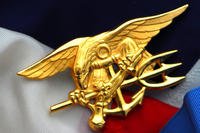A planned Navy and Marine Corps beach landing exercise on the island of Tinian in the Marianas was canceled last week after officials discovered evidence of an endangered turtle species nesting there.
Navy and Marine Corps units, including elements of the 31st Marine Expeditionary Unit, were in the region for Exercise Valiant Shield 2016, a biennial U.S. field training exercise focused on joint interoperability in a maritime environment. The canceled exercise was a planned Sept. 13 company-sized boat raid onto Tinian's Chulu Beach, employing troops from the MEU's Battalion Landing Team 2nd Battalion, 4th Marines.
The creatures that held the forces at bay were green sea turtles, III Marine Expeditionary Force spokesman Capt. Timothy Irish told Military.com. The turtles can grow to 350 pounds in size and have been listed as endangered since 1982.
Bill Kavanaugh, the regional and environmental coordinator for Naval Facilities Engineering Command, Marianas, said exercise planners had received advance warning that turtles might come between them and their combat objectives.
"We saw the hatching window would coincide with the window of the exercise and alerted military planners with alternative [courses of action] a month ago," he said in a statement.
The planned boat raid, which would have employed combat rubber raiding craft, was replaced with a helicopter-borne reconnaissance insert, Irish said. He added that no other training was affected by the presence of the turtles.
Troops participating in Valiant Shield had another chance to conduct an amphibious assault on Sept. 20, when 31st MEU personnel landed on a Guam beach using assault amphibious vehicles. Irish said this landing was pre-planned and not a replacement for the company boat raid.
In all, some 18,000 troops are participating in Valiant Shield, including a carrier strike group, an expeditionary strike group, and land-based air forces, Irish said in a news release.
"We need the ability to train to conduct beach landings," Lt. Col. Brian Greene, commanding officer of Battalion Landing Team 2nd Battalion, 4th Marines, said in a statement. "However, the strength of our [Marine air-ground task force] is the ability to project forces from the ship to an objective through the use of helicopters as well as surface craft. The MAGTF allows for a range of operations and we welcome the opportunity to exercise that flexibility."
Navy personnel comply with a number of restrictions and rules in order to protect the turtle population that nests within the Marianas. The beaches undergo monthly inspections, and all military landing sites must be inspected six hours prior to the anticipated operation. If a nest is spotted, officials will either close the beach to training or mark the nests for bypass, Irish said.
"The Marine Corps has experience with sea turtles and land tortoises in other training venues," he said. "We adhere to environmental considerations, U.S. law, respect for the environment, and maintaining the ability to conduct safe and realistic training to prepare our forces for war."
-- Hope Hodge Seck can be reached at hope.seck@military.com. Follow her on Twitter at@HopeSeck.






























